
Orthodox Judaism is the collective term for the traditionalist branches of contemporary Judaism. Theologically, it is chiefly defined by regarding the Torah, both Written and Oral, as revealed by God to Moses on Mount Sinai and faithfully transmitted ever since.
Modern Orthodox Judaism is a movement within Orthodox Judaism that attempts to synthesize Jewish values and the observance of Jewish law with the modern world.

Azriel Hildesheimer was a German rabbi and leader of Orthodox Judaism. He is regarded as a pioneering moderniser of Orthodox Judaism in Germany and as a founder of Modern Orthodox Judaism.
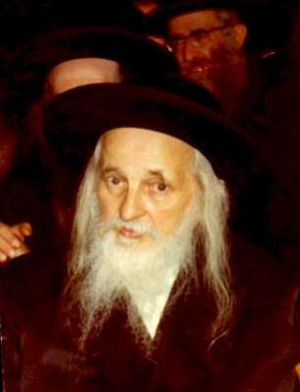
Joel Teitelbaum was the founder and first Grand Rebbe of the Satmar dynasty.
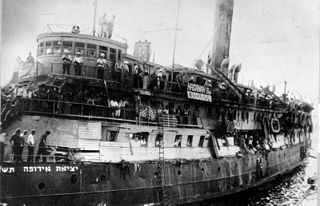
A homeland for the Jewish people is an idea rooted in Jewish history, religion, and culture. The Jewish aspiration to return to Zion, generally associated with divine redemption, has suffused Jewish religious thought since the destruction of the First Temple and the Babylonian exile.
Jewish religious movements, sometimes called "denominations", include diverse groups within Judaism which have developed among Jews from ancient times. Today in the west, the most prominent divisions are between traditionalist Orthodox movements and modernist movements such as Reform Judaism originating in late 18th century Europe, Conservative originating in 19th century Europe, and smaller others.

Arthur Hertzberg was a Conservative rabbi and prominent Jewish-American scholar and activist.
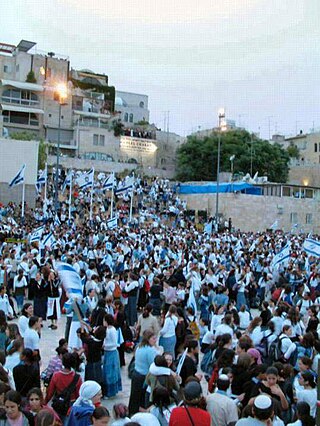
Religious Zionism is an ideology that views Zionism as a fundamental component of Orthodox Judaism. Its adherents are also referred to as Dati Leumi, and in Israel, they are most commonly known by the plural form of the first part of that term: Datiim. The community is sometimes called 'Knitted kippah', the typical head covering worn by male adherents to Religious Zionism.

Neologs are one of the two large communal organizations among Hungarian Jewry. Socially, the liberal and modernist Neologs had been more inclined toward integration into Hungarian society since the Era of Emancipation in the 19th century. This was their main feature, and they were largely the representative body of urban, assimilated middle- and upper-class Jews. Religiously, the Neolog rabbinate was influenced primarily by Zecharias Frankel's Positive-Historical School, from which Conservative Judaism evolved as well, although the formal rabbinical leadership had little sway over the largely assimilationist communal establishment and congregants. Their rift with the traditionalist and conservative Orthodox Jews was institutionalized following the 1868–1869 Hungarian Jewish Congress, and they became a de facto separate denomination. The Neologs remained organizationally independent in those territories ceded under the terms of the 1920 Treaty of Trianon, and are still the largest group among Hungary's Jews.

Gustav Gottheil was a Prussian-born American rabbi. Gottheil eventually became one of the most influential, well-known and controversial Reform Jewish leaders of his time. He was the father of Richard Gottheil.
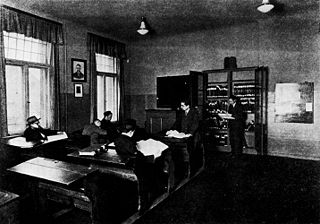
The Hildesheimer Rabbinical Seminary was founded in Berlin on 22 October 1873 by Rabbi Dr. Israel Hildesheimer for the training of rabbis in the tradition of Orthodox Judaism.
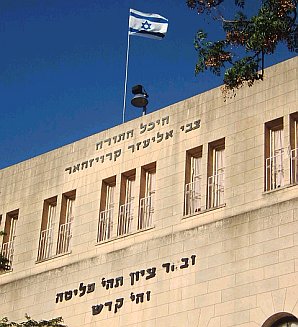
From the founding of political Zionism in the 1890s, Haredi Jewish leaders voiced objections to its secular orientation, and before the establishment of the State of Israel, the vast majority of Haredi Jews were opposed to Zionism, like early Reform Judaism, but with distinct reasoning. This was chiefly due to the concern that secular nationalism would redefine the Jewish nation from a religious community based in their alliance to God for whom adherence to religious laws were “the essence of the nation’s task, purpose, and right to exists,” to an ethnic group like any other as well as the view that it was forbidden for the Jews to re-constitute Jewish rule in the Land of Israel before the arrival of the Messiah. Those rabbis who did support Jewish resettlement in Palestine in the late 19th century had no intention to conquer Palestine and declare its independence from the rule of the Ottoman Turks, and some preferred that only observant Jews be allowed to settle there.

Yitzchak Yaacov Reines, was a Lithuanian Orthodox rabbi and the founder of the Mizrachi Religious Zionist Movement, one of the earliest movements of Religious Zionism, as well as a correspondent of Theodor Herzl.

The Religious Zionists of America (Hebrew official name: Religious Zionists of America/Mizrachi-Hapoel Hamizrachi, also known as Mizrachi, is an American-based organization that is the official body for those, mostly Modern Orthodox Jews who identify with Religious Zionism and support the goals of the general Mizrachi movement in America, Europe and Israel.

Israel Friedlander, also spelled Friedlaender, was a rabbi, educator, translator, and biblical scholar. Together with Rabbi Mordecai Kaplan, he was a founding adviser to a lecture series that became the Young Israel movement of Modern Orthodox Judaism.
Rb Dr Pinchas Kohn was the last rabbi of Ansbach, Germany. He was also the executive director of the World Agudath Israel organisation.
Rabbi Dr. Jacob Itzhak Niemirower was a Romanian Modern rabbi, theologist, philosopher and historian. Allied with reformist trends in Western and Eastern European Judaism, he served as the first Chief Rabbi of Romanian Jewry between 1921 and 1939, and was a member of the Romanian Senate from 1927 until his death.

Orthodox Jewish philosophy comprises the philosophical and theological teachings of Orthodox Judaism. Though Orthodox Judaism sees itself as the heir of traditional rabbinic Judaism, the present-day movement is thought to have first formed in the late 18th century, mainly in reaction to the Jewish emancipation and the growth of the Haskalah and Reform movements. Orthodox Jewish philosophy concerns itself with interpreting traditional Jewish sources, reconciling the Jewish faith with the changes in the modern world and the movement's relationships with the State of Israel and other Jewish denominations.
Rabbi Bernard Louis Levinthal, the "Dean of U. S. Rabbis," built Philadelphia's first Eastern European Orthodox Jewish community from his arrival in the United States in 1891 until his death in 1952. Rabbi Levinthal helped found American Jewish Orthodox institutions including Yeshiva University in 1896, the Orthodox Union in 1898, Mizrachi in 1902, and the American Agudas Harabbanim. His grave is in Congregation Mikveh Israel's 55th Street Cemetery in West Philadelphia.
Sigmund Maybaum was a Hungarian-born German Reform rabbi who served in Dolný Kubín, Žatec, Miskolc, and Berlin. He was an opponent of the Zionist movement.














